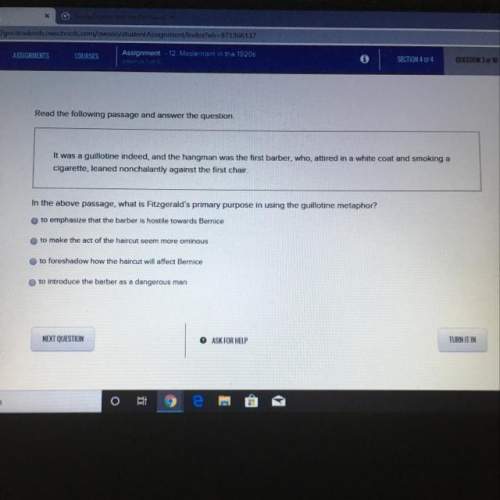
English, 22.06.2019 08:00 aliceohern
The play, doctor faustus, opens with a prologue. by describing faustus's beginnings as a child "base of stock" and his end as his "waxen wings" melted when "heaven conspired" to stop him, the chorus subtly calls to audience's minds, as they begin to view the play, the commonly held idea of the great chain of being the pact with the devil the seven deadly sins the renaissance man

Answers: 3


Other questions on the subject: English

English, 21.06.2019 16:30, DerekMoncoal
What to the slave is the fourth of july? by frederick douglass fellow-citizens—pardon me, and allow me to ask, why am i called upon to speak here to-day? what have i, or those i represent, to do with your national independence? are the great principles of political freedom and of natural justice, embodied in that declaration of independence, extended to us? and am i, therefore, called upon to bring our humble offering to the national altar, and to confess the benefits, and express devout gratitude for the blessings, resulting from your independence to us? but, such is not the state of the case. i say it with a sad sense of the disparity between us. i am not included within the pale of this glorious anniversary! your high independence only reveals the immeasurable distance between us. the blessings in which you this day rejoice, are not enjoyed in common. the rich inheritance of justice, liberty, prosperity, and independence, bequeathed by your fathers, is shared by you, not by me. the sunlight that brought life and healing to you, has brought stripes and death to me. this fourth of july is yours, not mine. you may rejoice, i must mourn. to drag a man in fetters into the grand illuminated temple of liberty, and call upon him to join you in joyous anthems, were inhuman mockery and sacrilegious irony. do you mean, citizens, to mock me, by asking me to speak to-day? fellow-citizens, above your national, tumultuous joy, i hear the mournful wail of millions, whose chains, heavy and grievous yesterday, are to-day rendered more intolerable by the jubilant shouts that reach them. if i do forget, if i do not faithfully remember those bleeding children of sorrow this day, "may my right hand forget her cunning, and may my tongue cleave to the roof of my mouth! " to forget them, to pass lightly over their wrongs, and to chime in with the popular theme, would be treason most scandalous and shocking, and would make me a reproach before god and the world. my subject, then, fellow-citizens, is american slavery. i shall see this day and its popular characteristics from the slave's point of view. standing there, identified with the american bondman, making his wrongs mine, i do not hesitate to declare, with all my soul, that the character and conduct of this nation never looked blacker to me than on this fourth of july. whether we turn to the declarations of the past, or to the professions of the present, the conduct of the nation seems equally hideous and revolting. what is one of the lessons douglass impresses on his listeners? a) the nation should not rejoice until everyone has freedom. b) he must speak on the fourth of july in order to bring change. c) for him to join the celebration would be treason. d) he can see the perspective of slaves and citizens with equal clarity.
Answers: 1

English, 21.06.2019 23:30, garciagang0630
With this 3 questions ! really need them right! 1. the first continental congress met in philadelphia on september 5, 1774. all of the colonies sent representatives except georgia. this congress continued in session until october 26, 1774. by then it had passed resolutions calling for a boycott against british trade. the author's main purpose was a. to inform b. to persuade c. to instruct d. to give an opinion 2. identify the point of view of each of the following passages. "my second mate was a round-cheeked, silent young man, grave beyond his years, i thought; but as our eyes happened to meet i detected a slight quiver on his lips. i looked down at once. it was not my part to encourage sneering on board my ship. it must be said, too, that i knew very little of my officers." (joseph conrad, "the secret sharer") a. first person b. third person limited c. third person omniscient d. none of the above 3. identify the point of view of each of the following passages. "he had only himself to in his choice: his fortune was his own; for as to frank, it was more than being tacitly brought up as his uncle's heir, it had become so avowed an adoption as to have him assume the name of churchill on coming of age. it was most unlikely, therefore, that he should ever want his father's assistance. his father had no apprehension of it." (jane austen, emma) a. third person omniscient b. third person limited c. first person d. none of the above
Answers: 1

English, 22.06.2019 02:30, sarahc63
In a group discussion, which statement most clearly uses evidence to support a conclusion? a) the author makes some good points, but i feel that he’s ultimately biased. b) the author proves that he’s biased when he uses terms like “silly” and “stupid”. c) the author obviously hates the way fast food tastes, which is why he’s negative. d) the author first criticizes fast food, and then goes in to criticize junk food.
Answers: 2

English, 22.06.2019 03:20, genyjoannerubiera
What are the authors purposes in writing its our world too young people who are making a difference
Answers: 2
You know the right answer?
The play, doctor faustus, opens with a prologue. by describing faustus's beginnings as a child "base...
Questions in other subjects:



Biology, 03.04.2021 04:50



Mathematics, 03.04.2021 04:50

Computers and Technology, 03.04.2021 04:50


Mathematics, 03.04.2021 04:50




